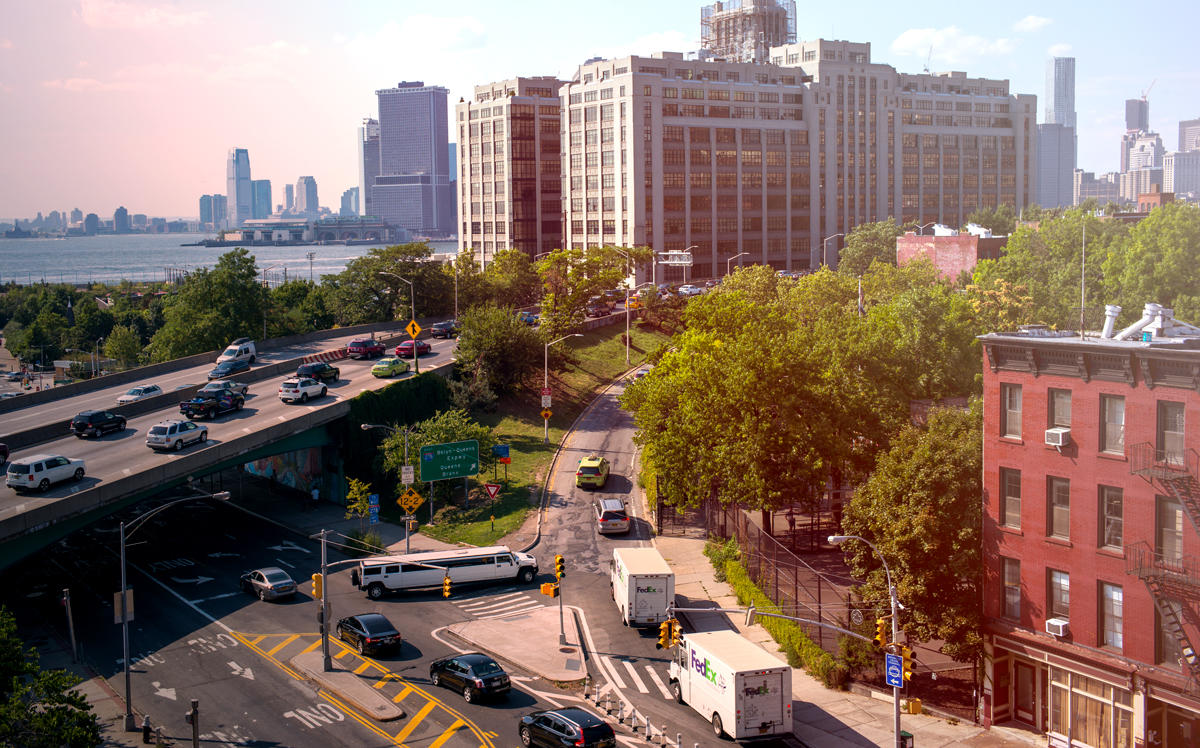The Brooklyn-Queens Expressway has long been one of New York City’s most notorious eyesores, but a report released Monday sketches out a better future for the roadway — and for its surrounding real estate.
The report, which the City Council released with the engineering and design firm Arup, rejects a plan to replace the Brooklyn Heights Promenade with a temporary highway during reconstruction of a deteriorating section. Instead it calls for a capped highway or a tunnel.
The former would consist of a street-level roadway with a deck built over it to support expanding Brooklyn Bridge Park. Estimated cost: $3.2 billion.
The tunnel would be even more expensive and ambitious, as it would enable the removal of the BQE in Cobble Hill, Brooklyn Heights, Dumbo, Fort Greene and Clinton Hill. In place of a noisy, air-polluting, traffic-choked, neighborhood-dividing road, Brooklynites would get such amenities as new parks or dedicated bike and transit lanes.
Both options are still just proposals and years away from coming to fruition, but local leaders agree that virtually any change to the infamous expressway would be good for nearby real estate.
“If the city were to do something really transformative — for example, remove the elevated highway and have a four-lane boulevard instead of the BQE — that can only have positive impacts on our neighborhoods for residents, for pedestrians, for children,” said Lara Birnback, executive director of the Brooklyn Heights Association.
Backers of a neighborhood-friendly project, which is likely to move fewer vehicles than the current roadway, were scheduled to appear with City Council Speaker Corey Johnson outside City Hall Tuesday morning to discuss the matter at a press conference, before a Council committee holds a hearing on the report.
Assembly member Jo Anne Simon, who represents Brooklyn neighborhoods including Carroll Gardens and Brooklyn Heights, said the already robust land values along the corridor would likely increase if the expressway were improved.
“Obviously the values of the properties right next to the highway are probably depressed versus something, say, six blocks away,” she said, although she noted, “In this part of Brooklyn, everything’s expensive.”
Broker Sandra Dowling, president of Brooklyn Heights Real Estate, echoed that point, noting that many of the neighborhoods through which the BQE runs are in demand despite the expressway.
“We’re doing quite well with property values now, even on the other side of the BQE toward the waterfront,” she said. “The Columbia Waterfront District has been able to revive itself.”
Still, she found the prospect of improving the expressway exciting, particularly the tunnel proposal, which she said would help reconnect many of Brooklyn’s neighborhoods.
“I think that would improve all of the property values because we would have one contiguous neighborhood going down to the waterfront,” she said. “I’d love to see that.”
Broker Kobi Lahav said the neighborhoods might take a hit during the work, but eventually would benefit greatly.
“Short term, it might actually deter people from buying there because of all that construction,” he said, “but I think people that actually bought there, if they go with scenario No. 2, where they actually have a bypass tunnel and just redevelop that area, I think it’s going to add a lot of value long term.”
Officials have spent years targeting the BQE for possible reforms and renovations, none of which has come to pass. This time, a project appears inevitable because a portion of the road known as a triple cantilever is rapidly deteriorating and may have only five years of safe use remaining. The initial plan to divert traffic by closing part of the promenade was beaten back by litigation and civic and political opposition.
“Are they going to turn around tomorrow and start working on a tunnel? I don’t have an answer on that,” Birnback said. “But I’m really hopeful that they’re going to stop kicking the can down the road. I think there’s a growing realization among elected officials, among city leaders, among communities that something has to happen, and it has to happen now.”
Erik Engquist contributed reporting.
Write to Eddie Small at es@therealdeal.com
